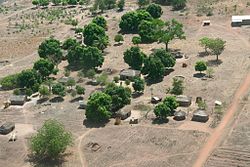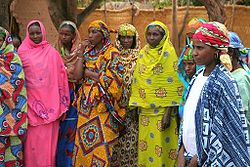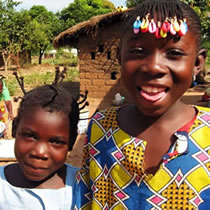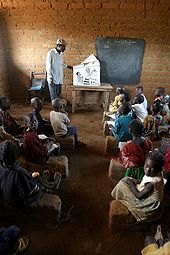Gays in Central African Republic
Both male and female same-sex sexual activities are technically legal in the Central African Republic, but same-sex couples are not socially acceptable and are subject to homophobic reactions from neighbors and authorities. Any public display of affection puts the people at risk for accusations of indecency and ‘public outrage’ . (http://en.wikipedia.org/wiki/LGBT_rights_in_the_Central_African_Republic)
Such homophobic attitudes are not surprising since there are many missionary groups operating in the country, including Lutherans, Baptists, Catholics, Grace Brethren, and Jehovah’s Witnesses.
The U.S. Department of State‘s 2010 Human Rights Report found that “the penalty for ‘public expression of love’ between persons of the same sex is imprisonment for six months to two years or a fine of between 150,000 and 600,000 CFA francs ($300 and $1,200). (This indicates that private consenting adult behavior is not penalized since it is not illegal.) When a relationship involves a child, the sentence is two to five years’ imprisonment or a fine of 100,000 to 800,000 CFA francs ($200 and $1,600); however, there were no reports that police arrested or detained persons they believed to be involved in homosexual activity.”
In most of Sub-Saharan Africa, however, homosexuality still is not a matter of public discussion, and the legal status of homosexuality does not state much about the status of homosexuals. Taboos in the general public are far more relevant. That does not mean there does not exist an underground gay/lesbian society, but not being an issue of public discussion, even individual awareness of homosexuality can be low.
Most African languages however have words for “gay” and “lesbian”, demonstrating a traditional knowledge of the existence of this sexual orientation. Official gay or lesbian couples/families however mostly remain unheard of. As for the legal status, the majority of West and East African nations that have law provisions on homosexuality have forbidden it, with some notable exceptions. In Guinea (Conakry), for example, where the law text outlawing homosexuality is not available, its illegality is known to the gay society. One source told Queer Afrol, “Gay Guineans often told me that one could go to jail if ever caught having sex with another man.”

Descriptions of Central African Republic
Comments about Central African Republic from War Child charity organization:
-There are estimated to be more than 3,000 children living on the streets of the capital Bangui.
-Obo in the south-east of the country is a remote area that is still plagued by the Lord’s Resistance Army. It’s a very insecure area where the population live within the confines of the protected towns but it’s too dangerous for us or them to travel between the towns or to farm their land.
-The Central African Army is supposed to protect the towns but this comes at a cost; many of the young women are involved in the sex trade as the soldiers are their biggest customers. A quarter of the people of the back-to-school project are girls who are former child prostitutes.
-More than half of its population live on less than $1.50 a day. The Central African Republic is one of the poorest countries in the world. It has one of the lowest life expectancies (47 years) and highest child mortality rates (more than 1 in 6 kids die before their 5th birthday).
-Its classrooms are empty, its hospitals destroyed, and its people are hungry. Many have fled their homes. The UN described the situation in Central African Republic as ‘the world’s most silent crisis’.
-The government is mostly ineffective beyond the capital Bangui, and armed violence is rife throughout the country. The Lord’s Resistance Army terrorize people in the south – close to the porous borders with Congo and southern Sudan. There’s an ongoing conflict between rival rebel groups and with the government in the north.
-NGOs don’t work there much, so you never see them talking about it in their appeals. It’s a hard place to get funding for because it’s not on government/UN/donor priority lists either. That’s maybe because it isn’t very politically significant because it doesn’t export or trade much. There’s no oil or valuable mineral resources that have attracted the interest of multi-national companies, foreign governments and warlords.
Website for British NGO War Child working in Central African Republic
http://www.warchild.org.uk/features/the-biggest-country-youve-never-heard-of?gclid=CN_-gJeCsq4CFWOMtgodsGceOA
More comments about Central African Republic from from Wikipedia:
-In February 2006, there were reports of widespread violence in the northern part of the CAR. Thousands of refugees fled their homes, caught in the crossfire of battles between government troops and rebel forces. More than 7,000 people fled to neighboring Chad. Those who remained in the CAR told of government troops systematically killing men and boys suspected of cooperating with rebels.
-The per capita income of the CAR is often listed as being around $300 a year, said to be one of the lowest in the world, but this figure is based mostly on reported sales of exports (food, cotton) and largely ignores the more important but unregistered sale of farm foods, locally produced alcohol, diamonds, ivory, bushmeat, and traditional medicine, for example. The informal economy of the CAR is more important than the formal economy for most Central Africans. Diamonds constitute the most important export of the CAR, accounting for 40–55% of export revenues, but an estimated 30–50% of the diamonds produced each year leave the country clandestinely.
-There are many missionary groups operating in the country, including Lutherans, Baptists, Catholics, Grace Brethren, and Jehovah’s Witnesses. While these missionaries are predominantly from the United States, France, Italy, and Spain, many are also from Nigeria, the Democratic Republic of the Congo, and other African countries. Many missionaries left the country due to fighting between rebel and government forces in 2002 and 2003. Many have now returned to the country and resumed their activities.
-The U.S. announced in October it was sending about 100 U.S. troops — mostly special operations forces — to Central Africa to advise in the fight against the Lord’s Resistance Army and its leader Joseph Kony, a bush fighter wanted by the International Criminal Court for crimes against humanity. U.S. troops are now stationed in bases in Uganda, Congo, South Sudan and Central African Republic. The LRA began its attacks in Uganda in the 1980s, when Kony sought to overthrow the government. Since being pushed out of Uganda several years ago, the militia has terrorized villages in Central Africa.
Children in the north of the country seen fighting in armed groups
http://www.un.org/children/conflict/english/central-african-republic.html
 The armed force CPJP reportedly has continued to recruit and force children in the north of the country. Children were seen fighting for both armed groups during the attack on Birao in Vakaga prefecture by CPJP in November. The presence of children within the Front démocratique du peuple centrafricain (FDPC) near Kabo (Ouham prefecture) and the Mouvement des libérateurs centrafricains pour la justice (MLJC) in Vakaga prefecture was also reported…
The armed force CPJP reportedly has continued to recruit and force children in the north of the country. Children were seen fighting for both armed groups during the attack on Birao in Vakaga prefecture by CPJP in November. The presence of children within the Front démocratique du peuple centrafricain (FDPC) near Kabo (Ouham prefecture) and the Mouvement des libérateurs centrafricains pour la justice (MLJC) in Vakaga prefecture was also reported…
At the end of the reporting period, all these children were reunified with their families and communities. It should be noted that towards the end of 2008, 775 children had been separated from APRD forces, bringing the total number of separated children to date to 1,300.
Central African Republic: UN Periodic Review
http://www.asylumlaw.org/legal_tools/index.cfm?category=348&countryID=233
Central African Republic
4 May 2005
Summary:
The Central African Republic was one of six African States supporting the General Assembly joint statement on sexual orientation, gender identity and human rights. The Summary of Stakeholders’ Information notes that “acts contrary to nature committed in a public place with an individual of the same sex” are criminalized under the Penal Code.
Suggested recommendations:
We commend the Central African Republic for endorsing the joint statement on sexual orientation, gender identity and human rights, delivered last December at the General Assembly. Can the delegation indicate what steps are being taken or planned to advance non-discrimination on these grounds? We note that some stakeholders expressed concern that art. 195 of the Penal Code, which prohibits offenses against morals, might be used to penalize same-sex activity between consenting adults, and recommend that consideration be given to reviewing this article to ensure that it does not discriminate on the ground of sexual orientation
European Region of the International Lesbian, Gay, Bisexual, Trans and Intersex Association (ILGA-Europe) and Canadian HIV/AIDS Legal Network
ILGA have the honor to present a statement on behalf of ILGA and Pan Africa ILGA.
We commend Central African Republic for its leadership, noted in the Working Group report, in supporting the joint statement on human rights, sexual orientation and gender identity delivered at the UN General Assembly last December, on behalf of 67 States from all 5 UN regions. Amongst other things, this statement urges States to take all the necessary measures “to ensure that sexual orientation or gender identity may under no circumstances be the basis for criminal penalties.”
 In furtherance of this commitment, we are keen to find out what is the government’s response to the recommendation 16 in paragraph 75, which recommends a full review of all national legislation relating to the principles of non-discrimination, particularly as it applies to women and sexual minorities.
In furtherance of this commitment, we are keen to find out what is the government’s response to the recommendation 16 in paragraph 75, which recommends a full review of all national legislation relating to the principles of non-discrimination, particularly as it applies to women and sexual minorities.
In this regard, we respectfully urge the Central African Republic to:
-To review its criminal legislation, particularly art. 195 of the Penal Code, to ensure that it does not discriminate on the ground of sexual orientation;
-To review all legislation to ensure no discrimination on the grounds of sexual orientation and gender identity;
-To take measures to recognize the sexual health and protect the rights of sexual minorities in accordance with international instruments.
We also welcome the support of the Central African Republic for recommendation 16 of paragraph 74 to ensure comprehensive training and education for all security forces and prison staff in human rights and international humanitarian law and would encourage the government to include education about sexual orientation and gender identity issues within such training.
2008 United States Human Rights Report
Partially in response to pressure from the UN ( and supported by the above recommendations from ILGA) the following report was issued from the State Department Bureau of Democracy, Human Rights, and Labor:
U.S. Country Reports on Human Rights Practices
February 25, 2009
Central African Republic
The penal code does not criminalize homosexual behavior; there were no reports that police arrested or detained persons they believed to be homosexual. Societal discrimination against homosexuals persisted during the year, and many citizens attributed the existence of homosexuality to undue Western influence.
Compiled by Richard Ammon, GlobalGayz.com
Further reading: Bringing Peace and Stability to C.A.R.
















